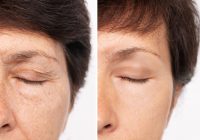Chemical peels have become a popular skincare treatment, endorsed by both celebrities and beauty enthusiasts. But what exactly are chemical peels, and how can you determine if they are the right choice for your skincare needs? In this blog, we’ll explore the benefits of chemical peels and provide guidance on deciding if this treatment is suitable for you.
What Are Chemical Peels? Chemical peels are non-surgical cosmetic procedures that involve the application of chemical solutions to the skin. These solutions exfoliate the top layer of skin, promoting the growth of new, healthier skin cells underneath. The degree of exfoliation and the type of chemical solution used can vary, allowing for customized treatments to address specific skin concerns.
Benefits of Chemical Peels:
- Improved Skin Texture: Chemical peels are renowned for their ability to refine skin texture. They effectively remove dead skin cells, reducing the appearance of fine lines, wrinkles, and rough patches.
- Even Skin Tone: Peels can help fade hyperpigmentation, sunspots, and acne scars, leaving your skin looking more even and radiant.
- Reduced Acne: Chemical peels can be an effective treatment for acne and acne-prone skin. They unclog pores, reduce inflammation, and prevent future breakouts.
- Enhanced Collagen Production: Peels stimulate collagen production, promoting firmer, more youthful-looking skin.
- Minimized Pore Size: The exfoliating action of peels can help reduce the appearance of enlarged pores.
- Glowing Complexion: Chemical peels can give your skin a healthy glow, making you look more refreshed and rejuvenated.
Deciding If a Chemical Peel Is Right for You: Determining whether a chemical peel is suitable for your skincare needs involves several considerations:
- Skin Concerns: Identify your specific skin concerns. Chemical peels are effective for a range of issues, from signs of aging to pigmentation problems and acne.
- Skin Type: Consult with a skincare professional to assess your skin type and its sensitivity. The type and strength of the chemical peel should match your skin’s needs.
- Consultation: Schedule a consultation with a qualified skincare specialist or dermatologist. They can evaluate your skin, discuss your goals, and recommend the most appropriate peel for you.
- Expectations: Have realistic expectations about the results. Chemical peels offer noticeable improvements, but they may require multiple sessions for optimal outcomes.
- Downtime: Consider the downtime associated with the peel you choose. Superficial peels typically have minimal downtime, while deeper peels may require more recovery time.
- Sun Protection: Commit to sun protection. After a chemical peel, your skin will be more susceptible to sun damage, so wearing sunscreen daily is crucial.
- Follow Instructions: Follow post-peel care instructions diligently. Proper skincare and maintenance are essential for achieving and maintaining the desired results.
- Budget: Evaluate your budget, as chemical peel costs can vary depending on the type and number of sessions required.
Chemical peels can be a transformative skincare treatment, addressing a wide range of concerns and leaving you with healthier, more radiant skin. However, the decision to get a chemical peel should be well-informed and tailored to your specific needs. By consulting with a skincare professional, understanding the benefits, and setting realistic expectations, you can decide if a chemical peel is the right choice for enhancing your skin’s natural beauty.








